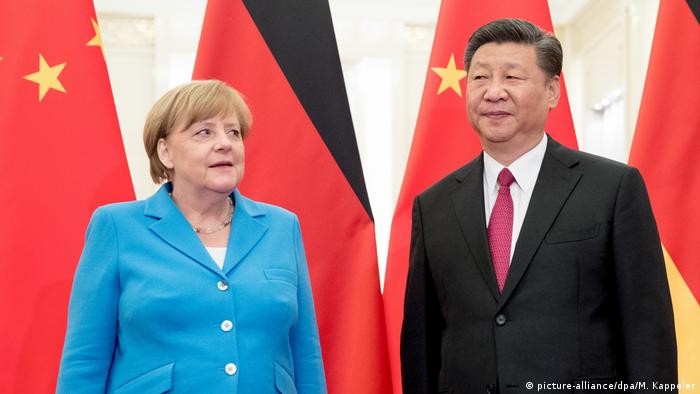Merkel is under pressure to cut Germany's ties with China as the Hong Kong crisis triggers a European backlash against Beijing
July 8 2020

- Germany's Chancellor Angela Merkel has come under heavy criticism from her own party and opposition politicians who say she is not taking a tough enough line on China.
- It comes amid international condemnation of China's new security law in Hong Kong, which critics say undermines the island's independence, and which has already seen police arrest hundreds of pro-democracy protesters.
- Powers including the US and the UK have all vocally condemned the new legislation, with the UK going as far as to offer citizenship to up to 3 million Hong Kong residents.
- Merkel, however, has been reluctant to condemn the move and insisted on the need to 'seek dialogue' with China on the basis of 'mutual trust.'
- It came as FBI director Christopher Wray said that China represented 'the greatest long-term threat' to US security and accused of secretive plots designed to steal state secrets.
The German Chancellor is under growing pressure to cut Germany's ties with Beijing as the Hong Kong crisis triggers a backlash against the Chinese government in Europe.
Figures from across the political spectrum in Germany this week accused Merkel of being too soft on China, after Germany's foreign ministry warned German citizens in Hong Kong not to post comments that could be perceived to be critical of China because they could possibly be arrested.
"What the German government said about Hong Kong was the absolute minimum, and it just wasn't enough," said Norbert Röttgen, a member of Merkel's Christian Democratic Union party and the head of the German parliament's foreign affairs committee, in comments reported by the Financial Times.

Merkel has long advocated strengthening diplomatic and economic ties between with Beijing, which is Germany's biggest trading partner. She said last week that she would "continue to seek dialogue and conversation" with China and insisted that ties with the country are of "strategic importance" to the European Union.
"Merkel's China policy is behind the times," said Nils Schmid, foreign policy spokesperson for the Social Democrats, the junior partner in Merkel's coalition government, according to the Financial Times report.
"She still sticks to this idea of convergence, that as we deepen our economic ties with China, it will become more liberal and western-oriented. But that's just out of date."
Her approach contrasts sharply with the tough response to the new security law taken by countries including the UK and US.
Boris Johnson, the UK prime minister, reacted to the news by offering residency visas up to 3 million Hong Kong citizens, denouncing Beijing's move as a "clear and serious" violation of the Sino-British treaty which governs the semi-autonomous island.
Beijing has responded by making multiple threats that it will carry out sanctions against the UK, with some China hawks in London warning that China's participation in Britain's nuclear programme could be the source of the next diplomatic row between the countries.
The US, meanwhile, has approved a series of sanctions on China, penalising banks which do business with Chinese officials, after House Speaker Nancy Pelosi branded the move a "brutal, sweeping crackdown against the people of Hong Kong, intended to destroy the freedoms they were promised."
On Tuesday, the FBI Director Christopher Wray said China was "the greatest long-term threat" to the US and detailed hundreds of secretive plots against Washington to steal state secrets, intellectual property, and forcibly repatriate its citizens.

"The Chinese government is engaged in a broad, diverse campaign of theft and malign influence, and it can execute that campaign with authoritarian efficiency," Wray said in a speech at the Hudson Institute in Washington, DC.
No comments:
Post a Comment
Comments always welcome!